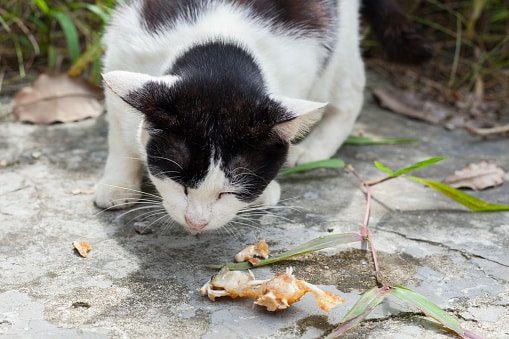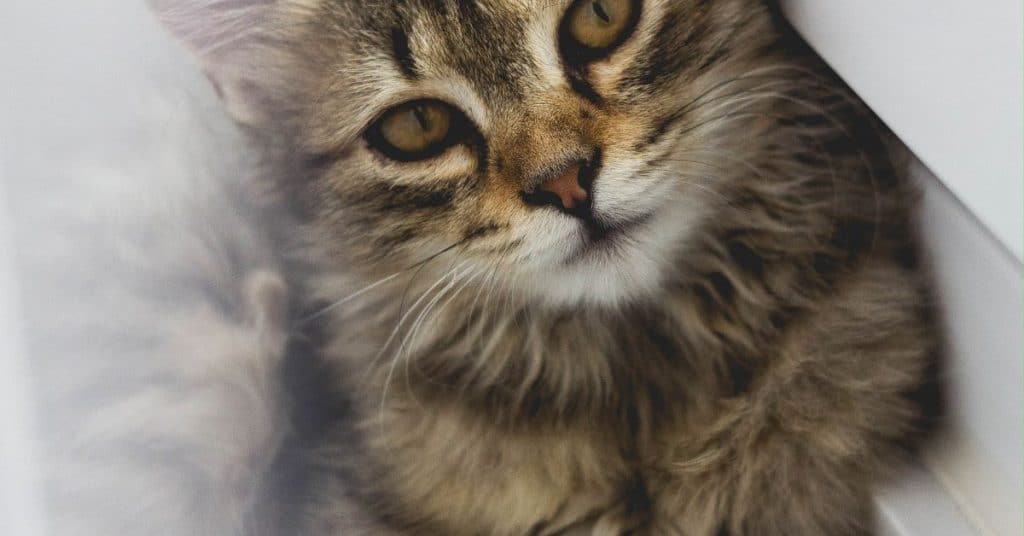Cats are obligate carnivores, no matter what breed you have. They can easily digest plant matter without any worry, but through a plant-based diet, they don’t meet all their nutritional needs. They may not be able to resist a chicken bone in front of them and may end up eating it.
Cats are known to have very sensitive stomachs. So if they eat anything that does not fit on the list of their daily diet, it may get worrisome for the owner. We know as pet owners that we all go through a tough situation of deciding what the best diet plan for our pet is. But some cat owners believe that since cats are carnivores as well as predators in the wild, raw bones can be a part of their regular diet.
But there are some considerations to make if your cat has eaten a chicken bone. You should not have much to worry about since cats usually don’t have problems with eating raw bones, but what about cooked bones?
What should you do if your cat ate chicken bone?
The first thing you must figure out is if your cat ate raw or cooked bones. Eating raw bones mostly won’t do your cat any harm but when it comes to your cat eating cooked bones you must instantly contact your vet and make them aware of what the scenario is like. So they know what’s coming their way.

Cooked bones can very easily be harmful to your cat, so make sure you do not wait for any symptoms and just go ahead and call your vet. You need to know if it’s a case wherein you have to rush your cat to the vet for a medical examination.
As mentioned earlier, waiting for symptoms to come up is not a great idea at all since until your cat shows any symptoms, it might be too late.
When it comes to raw chicken bones, shouldn’t be dangerous for your cat, but whenever you feed your cat raw chicken bones, it should be in a controlled manner. Your cat shouldn’t have the freedom to eat whatever they like. The food from your table should especially be kept away from your cat.
Symptoms That A Cat Ate Chicken Bone
The bone might get lodged in his intestines if it isn’t adequately digested, leading to an obstruction, a tear, or possibly both. As soon as you see that your cat has ingested a chicken bone, you must always call your vet for specific instructions.
In particular, if your cat consumed a chicken bone and is displaying any of the signs listed below, call your vet right once.
- Vomiting
- Seeming uncomfortable or painful, for example, sitting hunched up or growling when you touch his tummy
- Not passing faeces
- Bloated stomach
- Refusing to eat or drink
- Having less energy than he normally would
Can Cats Eat Chicken Bones?
If you want to start your cat on a raw food diet plan, then feeding them small birds is ideal. Cats can eat raw chicken bones.
Cats living in the wild, have been hunting and catching their prey for hundreds and thousands of years. That fact clearly says that cats can chew and eat bones.
There are fewer chances of gastrointestinal tract problems or suffocation upon the ingestion of small birds like turkeys and chickens. So we advise you to consider feeding chicken and turkeys only.
Can cats eat cooked chicken bones?
Cooked chicken bones must be at all times kept away from your pets, be it a cat or even a dog. Cooked bones alone hold the danger of threatening the health of your cat or even leading to death at times. Cooked bones can easily break down into tiny sharp fragments inside the body of your pet and cause a lot of damage.
Here are two main risks that are related to the ingestion of cooked bones: splintering and gastrointestinal blockages.
Splintering
Cooked bones are much more harmful than raw bones because they are brittle as well as weak. Being brittle and weak does them no good, so that’s why they tend to splinter more easily. Once they splinter in the body of your cat it causes nothing but damage.
Splinters often lead to holes in the intestines or stomach, making wounds that let the guy bacteria out. Several infections or diseases are caused when the bacteria mixes up with the blood and circulates easily throughout the entire body.
The organs that are wounded can jump into necrosis easily and die soon after. It is advisable to avoid this situation at the root of the problem and not feed your cat-cooked bones at all.
Gastrointestinal Blockage
Cooked bones can easily get stuck in the digestive tract since they are not as flexible as raw bones. As the bone passes or tries to get through the stomach and intestine and due to the stuck bones in the digestive tract suffocation can come into the picture.
No matter what the size of the bone is as long as it was a cooked bone that your cat swallowed there are good chances of a blockage being caused which won’t allow the bone to come out.
You need to make sure to observe your cat constantly. As soon as they show unusual or abnormal behaviour you need to take them to your vet. If you don’t manage to find the bone in the feces or don’t see your cat showing any signs of discomfort then immediately call your veterinarian in order to avoid the dangerous results and let them be medically examined.
Can Cats Eat Raw Chicken Bones?
There are many cat owners that include raw bones in their pet’s diets keeping in mind the benefits these bones hold as well as the carnivore and predatory aspects of the cats. Cats that are fed chicken bones instantly gain a lot of benefits from it.
Benefits of Raw Chicken Bones
In the wild, raw bones are known to be a rich source of nutrients and also provide them with the perfect components for their survival. They are also good for the health of your cat’s teeth.
Oral Health
Cats are as curious as dogs to chew on things. Cats and dogs, both, have the urge to chew on things. Especially cats are good chewers and there is nothing more satisfying for them than chewing on something delicious like raw bones.
A very common problem in cats is plaque and tartar. Chewing on raw bones will clean their teeth from plaque and tartar leaving them with good strengthened teeth. Besides maintaining good oral health, chewing on bones also satisfies and entertains your cat.
Nutrients
Bones include various nutrients that are beneficial for the least of your cat. They provide a good source of vitamins and minerals such as calcium, potassium, magnesium, and phosphorus. What about raw bone marrow? Rawbone marrow is a good source of iron and blood cells.
Calcium
Vitamins such as A, D, and E as well as minerals like copper and zinc are amplified by calcium and that’s why it’s so useful.
Calcium is beneficial for your cat’s brain, muscles, bones, and organs. How? What role does calcium play in a cat’s body? It helps to assimilate the nutrients more quickly and easily so they can be used efficiently. This is how calcium is beneficial for your cat.
How to safely feed raw bones to your cat?
It’s great that you have decided to include raw bones in your cat’s diet! But before you do it, don’t forget to make sure you take one step at a time considering all the precautions to be taken.
Cats are known to have a sensitive stomachs so they can get sensitive to changes in their diet plans. So make sure to check everything before you start feeding your cat some bones.
- Speak to a professional: without the consultation of your vet, do not feed your cat bones. Go through your cat’s medical history and decide if it’s the right choice for their good health or not.
- Bone size and type: it’s always better to choose bones from small animals like turkeys, ducks, or chickens. Make sure to feed your cat the right size of bones, not too big, not too small.
- Supervise: in situations where something goes wrong while your cat is chewing on a bone you should be there to intervene. So make sure to supervise your cat while they are chewing on bones.
- Going gradually: raw bones should not be a regular thing for your cats to chew. Give them time, let them get used to it slowly. You start off with feeding them bones maybe once a week or even lesser times than that just to see what suits them the best. Then you can gradually start increasing the number of bones you serve after observing them for a while.
- Habits: while they’re still kittens it is better to start with a raw bone diet. Why so? Because this gives them time to figure out what is the right way to chew bones.

Conclusion
Cats can eat raw bones when supervised. But cooked bones? No way!!! Do not feed them raw bones on a regular basis, give them time and let them get used to it accordingly.
Your cat’s health is in your hands. You have the responsibility to look after them in the best way possible, don’t let it slip off your hands by choosing the wrong diet for them. After all, they’re just tiny cute creatures.
